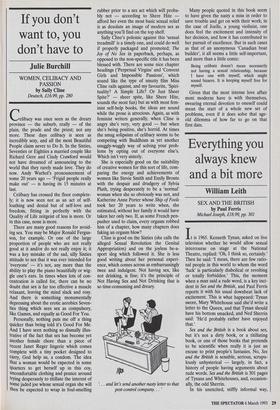If you don't
want to, you don't have to
Julie Burchill
WOMEN, CELIBACY AND PASSION by Sally Cline Deutsch, £16.99, pp. 280 Celibacy was once seen as the dreary province — the suburb, really — of the plain, the prude and the priest; not any more. These days celibacy is seen as incredibly sexy, and all the most Beautiful People claim never to Do It. In the Sixties, Seventies or Eighties a married couple like Richard Gere and Cindy Crawford would not have dreamed of announcing to the world that they rarely made love. They do now. Andy Warhol's pronouncement of some 20 years ago — 'Frigid people really make out' — is having its 15 minutes at last.
Celibacy has crossed the floor complete- ly; it is now seen not as an act of self- loathing and denial but of self-love and freedom, fitting in perfectly with the Quality of Life zeitgeist of less is more. Or in this case, none is more.
There are many good reasons for avoid- ing sex. You may be Major Ronald Fergus- son, for example. Or one of the large proportion of people who are not really good at it and/or do not really enjoy it; it was a key mistake of the sad, silly Sixties attitude to sex that it was ever intended for 'everyone' — it's not, any more than the ability to play the piano beautifully or wig- gle one's ears. In times when lots of con- centration is called for, there can be no doubt that sex is far too effective a muscle relaxant, leaving the mind slack and rosy. And there is something monumentally depressing about the erotic aerobics Seven- ties thing which sees sex as compulsory, like Games, and equally as Good For You.
Personally, nothing puts me off a thing quicker than being told it's Good For Me. And I have seen nothing so dismally illus- trative of the fact that sex has become yet another female chore than a piece of recent Janet Reger lingerie which comes Complete with a tiny pocket designed to carry, God help us, a condom. The idea that a woman would be expected in some quarters to get herself up in this coy, uncomfortable clothing and prance around trying desperately to titillate the interest of some jaded joe whose sexual organ she will then be expected to wrap in foul-smelling rubber prior to a sex act which will proba- bly not — according to Shere Hite — afford her even the most basic sexual relief is as desolate an image of modern sex as anything you'll find on the top shelf.
Sally Cline's polemic against this 'sexual treadmill' is a timely one, and could do well if properly packaged and promoted; The Joy of No Sex in paperback, perhaps, as opposed to the non-specific title it has been blessed with. There are some nice chapter headings (Perpetual Virgins' and 'Convent Girls and Impossible Passions', which sound like the type of smutty film Miss Cline rails against, and my favourite, 'Spiri- tuality? A Simple Life? Or Just Sheer Spite?' — sheer spite, like Shere Hite, sounds the most fun) but as with most fem- inist self-help books, the ideas are sound while the prose is atrocious. Again, as with feminist writers generally, when Cline is angry she's very, very good — but when she's being positive, she's horrid. At times the smug solipsism of celibacy seems to be competing with Buddhism as yet another snuggly-wuggly way of solving your prob- lems by opting out of everyone else's. Which isn't very sisterly.
She is especially good on the suitability of creative women for this sort of life, com- paring the energy and achievements of women like Stevie Smith and Emily Bronte with the despair and drudgery of Sylvia Plath, trying desperately to be a 'normal' woman when she so obviously was not, and Katherine Anne Porter whose ship of Fools took her 20 years to write when, she estimated, without her family it would have taken her only two. If, as some French pen- pusher used to claim, every orgasm robbed him of a chapter, how many chapters does faking an orgasm blow?
Cline is good on the Sixties (she calls the alleged Sexual Revolution the Genital Appropriation) and on the joyless be-a- sport slog which followed it. She is less good writing about her personal experi- ence, which comes across as embarrassingly twee and indulgent. Not having sex, like not drinking, is fine; it's the principle of Not Having Sex and Not Drinking that is so time-consuming and dreary.
`.. . and let's send another nasty letter to that pest-control company. . . ' Many people quoted in this book seem to have given the nasty a miss in order to save trouble and get on with their work; in the case of Joelle, a young violinist, one does feel the excitement and intensity of her decision, and how it has contributed to her pursuit of excellence. But in such cases as that of an anonymous 'Canadian boat builder', it all seems a little self-important, and more than a little comic:
Being celibate doesn't mean necessarily not having a sexual relationship, because I have one with myself, which might sound bizarre. It is keeping myself free for myself.
Given that the most intense love affair most moderns have is with themselves, swearing eternal devotion to oneself could mean the start of a whole new set of problems, even if it does solve that age- old dilemma of how far to go on that first date.


















































 Previous page
Previous page